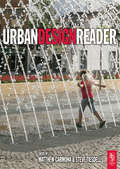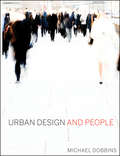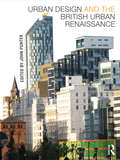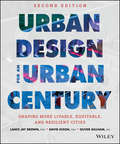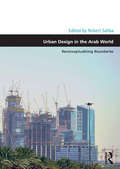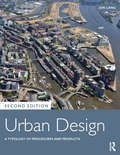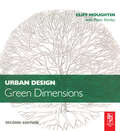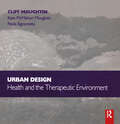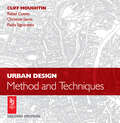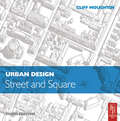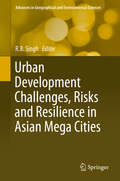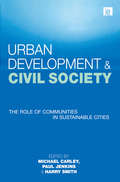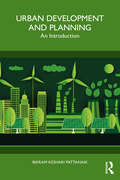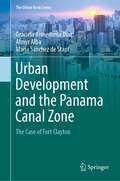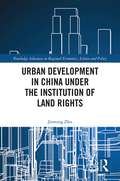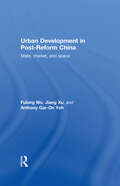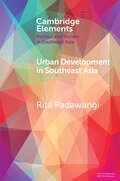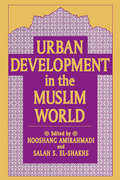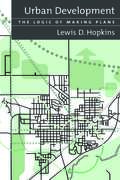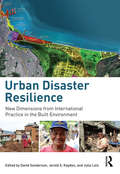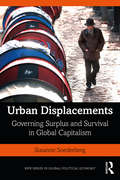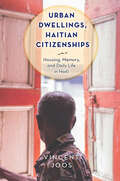- Table View
- List View
Urban Design Reader
by Steve Tiesdell Matthew CarmonaEssential reading for students and practitioners of urban design, this collection of essays introduces the 6 dimensions of urban design through a range of the most important classic and contemporary key texts. Urban design as a form of place making has become an increasingly significant area of academic endeavour, of public policy and professional practice. Compiled by the authors of the best selling Public Places Urban Spaces, this indispensable guide includes all the crucial definitions and various understandings of the subject, as well as a practical look at how to implement urban design that readers will need to refer to time and time again. Uniquely, the selections of essays that include the works of Gehl, Jacobs, and Cullen, are presented substantially in their original form, and the truly accessible dip-in-and-out format will enable readers to form a deeper, practical understanding of urban design.
Urban Design and People
by Michael DobbinsThis introduction to the field of urban design offers a comprehensive survey of the processes necessary to implement urban design work, explaining the vocabulary, the rules, the tools, the structures, and the resources in clear and accessible style. Providing a comprehensive framework for understanding urban design principles and strategies, the author argues that urban design is both a process and a collaboration in which the different forces involved are knit together. Moving from the regional scale down to the scale of places, the book examines the goals and strategies of the urban designer from the viewpoints of the private sector, public sector, and community. The text is illustrated throughout with photographs and drawings that make theory and practice relevant and alive.
Urban Design and the British Urban Renaissance
by John PunterAre Britain’s cities attractive places in which to live, work and play? Asking that question, this is a critical review of how the design dimension of the Urban Renaissance strategy was developed and applied, based on expert academic assessments of progress in Britain’s thirteen largest cities. The case studies are preceded by a dissection of New Labour’s renaissance agenda, and concluded by a synthesis of achievements and failings. Exploring the implications of this strategy for the future of urban planning and design, this is a must-read for students, practitioners of these subjects and for all those who wish to improve the quality of the British urban environment.
Urban Design for an Urban Century: Shaping More Livable, Equitable, and Resilient Cities
by Lance Jay Brown David DixonThis book offers a comprehensive introduction to urban design, from a historical overview and basic principles to practical design concepts and strategies. It discusses the demographic, environmental, economic, and social issues that influence the decision-making and implementation processes of urban design. The Second Edition has been fully revised to include thorough coverage of sustainability issues and to integrate new case studies into the core concepts discussed.
Urban Design in the Arab World: Reconceptualizing Boundaries (Design and the Built Environment)
by Robert SalibaThe Arab World is perceived to be a region rampant with constructed and ambiguous national identities, overwhelming wealth and poverty, religious diversity, and recently the Arab uprisings, a bottom-up revolution shaking the foundations of pre-established, long-standing hierarchies. It is also a region that has witnessed a remarkable level of transformation and development due to the accelerated pace imposed by post-war reconstruction, environmental degradation, and the competition among cities for world visibility and tourism. Accordingly, the Arab World is a prime territory for questioning urban design, inviting as it does a multiplicity of opportunities for shaping, upgrading, and rebuilding urban form and civic space while subjecting global paradigms to regional and local realities. Providing a critical overview of the state of contemporary urban design in the Arab World, this book conceptualizes the field under four major perspectives: urban design as discourse, as discipline, as research, and as practice. It poses two questions. How can such a diversity of practice be positioned with regard to current international trends in urban design? Also, what constitutes the specificity of the Middle Eastern experience in light of the regional political and cultural settings? This book is about urban designers ’on the margins’: how they narrate their cities, how they engage with their discipline, and how they negotiate their distance from, and with respect to global disciplinary trends. As such, the term margins implies three complementary connotations: on the global level, it invites speculation on the way contemporary urban design is being impacted by the new conceptualizations of center-periphery originating from the post-colonial discourse; on the regional level, it is a speculation on the specificity of urban design thinking and practice within a particular geographical and cultural context (here, the Arab World); and finally, on the local level, it is an a
Urban Design: A Typology of Procedures and Products
by Jon LangUrban Design: A Typology of Procedures and Products, 2nd Edition provides a comprehensive and accessible introduction to urban design, defining the field and addressing the controversies and goals of urban design. Including over 50 updated international case studies, this new edition presents a three-dimensional model with which to categorize the processes and products involved: product type, paradigm type, and procedural type. The case studies not only illuminate the typology but provide information that designers can use as precedents in their own work. Uniquely, these case study projects are framed by the design paradigm employed, categorized by procedural type instead of instrumental or land use function. The categories used here are Total Urban Design, All-of-a-piece Urban Design, Plug-in Urban Design, and Piece-by-piece Urban Design. Written for both professionals and those encountering urban design in their day-to-day life, Urban Design is an essential introduction to the field and practice, considering the future direction of the field and what can be learned from the past.
Urban Design: A Typology of Procedures and Products
by Jon LangUrban Design: A Typology of Procedures and Products, 2nd Edition provides a comprehensive and accessible introduction to urban design, defining the field and addressing the controversies and goals of urban design. Including over 50 updated international case studies, this new edition presents a three-dimensional model with which to categorize the processes and products involved: product type, paradigm type, and procedural type. The case studies not only illuminate the typology but provide information that designers can use as precedents in their own work. Uniquely, these case study projects are framed by the design paradigm employed, categorized by procedural type instead of instrumental or land use function. The categories used here are Total Urban Design, All-of-a-piece Urban Design, Plug-in Urban Design, and Piece-by-piece Urban Design.Written for both professionals and those encountering urban design in their day-to-day life, Urban Design is an essential introduction to the field and practice, considering the future direction of the field and what can be learned from the past.
Urban Design: Green Dimensions (Urban Design)
by Peter Shirley Cliff MoughtinIn Green Dimensions, Cliff Moughtin relates sustainable development and green design to the realm of urban design and development. Examining regional and local frameworks for design and planning, this book shows how sustainable urban design can be implemented on every scale.Working from a strong theoretical base, the author uses case studies and discusses policy developments, in order to challenge the conventional wisdom onsustainable design. The book provides a rounded discussion of the application and suitability of current practice, and predicts future design needs.Updating the reader on topics such as energy efficiency, sustainable city forms and the culture of new urbanism, this completely revised and restructured second edition also includes brand new chapters on the Urban Park and Bio-diversity.
Urban Design: Health and the Therapeutic Environment
by Paola Signoretta Kate McMahon Moughtin J.C. Moughtin'Urban Design: Health and the Therapeutic Environment' demonstrates how urban design and planning impact on public health and sustainable development. Moughtin et al. explore the concept of what makes a physically and psychologically ‘healthy’ environment in the context of the paramount need for new homes where living standards are not compromised, in increasingly crowded cities. • Sets out the history and development of the healthy city, from the English spa town to standards of care in Cuba to provide a context for modern urban health development. • Covers a wide range of environmental, ecological, health and epidemiological issues. • Case studies and examples show how health policy and procedure is practically applied to sustainable urban development. 'Urban Design: Health and the Therapeutic Environment' outlines best practice for healthy, sustainable urban design and provides a reference tool for architects, urban designers, landscape architects, health professionals and planners. Emeritus Professor Cliff Moughtin was Professor of Planning in The Queen’s University Belfast and The University of Nottingham. He is author of a number of books including the series of five Urban Design titles for Architectural Press. Kate McMahon Moughtin is a psychotherapist. She is author of Focused Therapy for Organisations and Individuals. She is interested in how literature and environmental infl uences contribute to wellbeing. Paola Signoretta is a human geographer. She is a senior research associate in the Centre for Research in Social Policy, Loughborough University. She is interested in the geographies of health, deprivation and social and financial exclusion.
Urban Design: Method And Techniques
by Paola Signoretta Rafael Cuesta Christine Sarris J.C MoughtinThis book deals with a wide range of techniques used in the urban design process. It then goes on to relate these techniques to a unique, comprehensive account of method. A method of urban design is developed which has sustainability and environmental protection at the centre of its philosophy. Previously, literature regarding the urban design method has been almost totally neglected; this book introduces the topic to the reader. This revised Second Edition encompasses the latest techniques including the development of geographic information systems and financial techniques which help evaluate projects.A number of techniques are illustrated by example or case study. Where techniques are discussed they are located within the structure of the design process. The book develops a logical framework for a process, which includes problem definition, survey, analysis, concept generation, evaluation and implementation. It is this framework which leads toward the development of an urban design method. This book is a practical guide for students or professionals in the early part of their careers. It is organized so that each chapter provides guidance which readers would have otherwise had to discover for themselves, often with some difficulty.
Urban Design: Street And Square (Urban Design Ser.)
by Cliff MoughtinThis book, part of a series of four, offers a detailed analysis of urban design, covering the streets, squares and buildings that make up the public face of towns and cities. It outlines the theory of the principal features of urban design from which method is developed and provides a better understanding of the main elements of urban design. This includes the arrangement, design and details of the streets and squares, and the roles they play in city planning.This third edition includes chapters on "Sustainable Urban Design" and "Visual Analysis", introducing the latest theories and influences in the field and bringing greater practical significance to the book. Cliff Moughtin explores the street and square in terms of function, structure and symbolism and examines fine examples in their historical context. These are set against the background of the laws of urban design composition, culled from Renaissance and modern writers.
Urban Development Challenges, Risks and Resilience in Asian Mega Cities
by R. B. SinghIn this book, an interdisciplinary research group of faculty members, researchers, professionals, and planners contributed to an understanding of the dynamics and dimensions of emerging challenges and risks in megacities in the rapidly changing urban environments in Asia and examined emerging resilience themes from the point of view of sustainability and public policy. The world's urban population in 2009 was approximately 3. 4 billion and Asia's urban population was about 1. 72 billion. Between 2010 and 2020, 411 million people will be added to Asian cities (60 % of the growth in the world's urban population). By 2020, of the world's urban population of 4. 2 billion, approximately 2. 2 billion will be in Asia. China and India will contribute 31. 3 % of the total world urban population by 2025. Developing Asia's projected global share of CO2 emissions for energy consumption will increase from 30 % in 2006 to 43 % by 2030. City regions serve as magnets for people, enterprise, and culture, but with urbanisation , the worst form of visible poverty becomes prominent. The Asian region, with a slum population of an estimated 505. 5 million people, remains host to over half of the world's slum population . The book provides information on a comprehensive range of environmental threats faced by the inhabitants of megacities. It also offers a wide and multidisciplinary group of case studies from rapidly growing megacities (with populations of more than 5 million) from developed and developing countries of Asia.
Urban Development and Civil Society: The Role of Communities in Sustainable Cities
by Harry Smith Michael CarleyThe world's population is rapidly urbanizing but the affluence and development often associated with cities are far from equitably or sustainably distributed. Where it was once taken for granted that responsibility for urban development lay with the state, increasingly the emphasis has shifted to market-driven and public-private sector initiatives, which can marginalize the intended beneficiaries - the urban poor - from decision making and implementation. This text outlines the essential conditions for effective urban planning and management by placing bottom-up community initiatives at the heart of the push for equitable and sustainable development in cities. Crucially, the state must engage with both the market and civil society in pursuit of sustainable cities. Presenting a wide-ranging selection of case studies in rapidly urbanizing and transitional countries, from the poorest parts of Africa and Asia to the relatively developed United Kingdom, the authors describe and analyze innovations in how globally disadvantaged urban communities can be engaged in improving their living environments.
Urban Development and Planning: An Introduction
by Bikram PattanaikThis book details the most contemporary concerns related to urban development, governance, and planning, as well as the challenges to urban administration. It analyses the policies and programmes adopted by both high-income and lower-middle-income countries to achieve sustainable urbanization and their application and treatment to help students get a holistic, practical perspective of the issues at hand.This volume elucidates urban development theories and approaches, coupled with urban planning, local government finance, urban management, and urban governance. It also discusses urban issues and challenges such as education, health, waste management, land use planning, housing, and transport. Critical concerns related to urban water bodies, open spaces, urban heritage and smart cities, and urban future are similarly addressed.This book will be useful to students, researchers, and teachers of urban planning and architecture, urban sociology, economics, geography, environmental science, and public administration. It shall also be useful to NGOs, parastatal bodies, and trainers of urban planning and development. Planners, policymakers, functionaries, and elected representatives of urban local bodies may also use this book as a capacity-building instrument.
Urban Development and the Panama Canal Zone: The Case of Fort Clayton (The Urban Book Series)
by Graciela Arosemena Díaz Almyr Alba María Sánchez StapfThe construction of the Panama Canal at the beginning of the twentieth century created an enclave that ran parallel to the interoceanic waterway, controlled by the US government: the Canal Zone. This book aims to understand the implications that Panama Canal Zone urban planning had on human health, natural resources, and biodiversity through the study case of Fort Clayton, highlighting how the sanitary concerns shaped building regulations and the urban landscape of towns.This book highlights the role of North American entomologists and health workers in developing control strategies for diseases transmitted by mosquitoes and how mosquito’s ecology determined building regulations that shaped the image of the Canal Zone towns. On the other hand, the book determines the environmental assessment of Fort Clayton, determined by the two fundamental aspects that set on the environmental impact of an urban settlement. The first one is the suitability of the site's location. The second is the urban structure of the adopted city model and its impact on the connectivity of the surrounding forests during the twentieth century.This text is aimed at both undergraduate and postgraduate students, architects, urban planners, historians, and environmental science professionals.
Urban Development in China under the Institution of Land Rights (Routledge Advances in Regional Economics, Science and Policy)
by Jieming ZhuHow have the development and redevelopment of China’s cities since the early 1950s transformed the settlements and fortunes of a fifth of the world’s population? Rapid urbanization since the 1980s has changed the nation from a rural society to an urban one, marking it as one of the most significant transformations in history. As a country with severe land scarcity, land resources are intensively contested for during urbanization under the new regime of marketization. This book focuses on the impact of the institution of land rights that have transitioned from private ownership to socialist state ownership, and subsequently to public land leasing in the urban domain, and to collective ownership in rural areas. In the context of defining the relationship between the state and the market, the gradualist transition of land rights gives rise to intriguing processes of place-making. The elaboration of these processes will engage several revealing conceptual notions: land as a means of production, land commodification, ambiguous land rights, incomplete land rights, trading land use rights for land development rights, institutional uncertainty, land rent seeking and dissipating, local developmental state, danwei-enterprises, and more. The newly created landed interests are embedded intricately within the urban spatial structure. This book would especially be of interest to scholars interested in developmental economics, urban planning, geography, public policies, public management, and sociology, and also practitioners focusing on development and planning.
Urban Development in Post-Reform China: State, Market, and Space
by Fulong Wu Jiang Xu Anthony Gar-On YehRadically reoriented under market reform, Chinese cities present both the landscapes of the First and Third World, and are increasingly playing a critical role in the country’s economic development. Yet, radical marketization co-exists with the ever-presence of state control. Exploring the interaction of China’s market development, state regulation and the resulting transformation and creation of new urban spaces, this innovative, key book provides the first integrated treatment of China’s urban development in the dynamic market transition. Focusing on land and housing development, the authors, all renowned authorities in this field, show how the market has been ‘created’ under post-reform urban conditions, and examine ‘the state in action’, highlighting how changing urban governance towards local entrepreneurial state facilitates market formation. A significant, original contribution, they highlight the key actors and their institutional contexts. China has been very successful in using urban land development as an economic growth engine, and here the authors investigate complex interactions between the market and state in creating this new urbanism. Taking a unique perspective, they marshal original ideas and empirical work based on field studies and collaborative work with colleagues in China.
Urban Development in Southeast Asia (Elements in Politics and Society in Southeast Asia)
by Rita PadawangiUrbanization as a process is rife with inequality, in Southeast Asia as anywhere else, but resistance and contestation persist on the ground. In this element, the author sets out to achieve three goals: 1) to examine the political nature of urban development; 2) to scrutinize the implications of power inequality in urban development discussions; and 3) to highlight topical and methodological contributions to urban studies from Southeast Asia. The key to a robust understanding is groundedness: knowledge about the everyday realities of urban life that are hard to see on the surface but dominate how the city functions, with particular attention to human agency and the political life of marginalized groups. Ignoring politics in research on urbanization essentially perpetuates the power inequities in urban development; this element thus focuses not just on Southeast Asian cities and urbanization per se, but also on critical perspectives on patterns and processes in their development.
Urban Development in the Muslim World
by HOOSHANG AMIRAHMADI and SALAH S. EL-SHAKHSWar and revolution have focused the world's attention on the Middle East. Despite the headlines, the editors of this book state, the economic, political, and cultural aspects of urban life in the Muslim world are hardly known to us. Contributors to this volume explore urban problems, urban development, and the practice of urban planning in the Muslim world.In both comprehensive analyses and detailed case studies, the contributors address the basic dilemma of development planning: how to integrate the force of tradition with the demands of modernity. Specifically, some of the topics covered include the examination of the idea of a uniquely Islamic city; the influence of Islam on the medinas of Tunisia and Morocco and on the development of Mecca and Delhi; and reconciling tradition and modernism in Tehran.Also covered are the comparative development of Sana'a and Cairo; the influence of oil on urbanization in the Persian Gulf; urban growth in Syria; and an overview of urban planning in the Arab world. This compendium is essential for specialists and students of the region, for international planning and development practitioners, and for those seeking insight into the complexities of this important but arguably least understood region of the world.
Urban Development: The Logic Of Making Plans
by Lewis D. HopkinsWith increased awareness of the role of plans in shaping urban and suburban landscapes has come increased criticism of planners and the planning profession. Developers, politicians, and citizens alike blame "poor planning" for a host of community ills. But what are plans really supposed to do? How do they work? What problems can they successfully address, and what is beyond their scope? In Urban Development, leading planning scholar Lewis Hopkins tackles these thorny issues as he explains the logic of plans for urban development and justifies prescriptions about when and how to make them. He explores the concepts behind plans, some that are widely accepted but seldom examined, and others that modify conventional wisdom about the use and usefulness of plans. The book: places the role of plans and planners within the complex system of urban development offers examples from the history of plans and planning discusses when plans should be made (and when they should not be made) gives a realistic idea of what can be expected from plans examines ways of gauging the success or failure of plansThe author supports his explanations with graphics, case examples, and hypothetical illustrations that enliven, clarify, and make concrete the discussions of how decisions about plans are and should be made.Urban Development will give all those involved with planning human settlements a more thorough understanding of why and how plans are made, enabling them to make better choices about using and making plans. It is an important contribution that will be essential for students and faculty in planning theory, land use planning, and planning project courses.
Urban Disaster Resilience: New Dimensions from International Practice in the Built Environment
by David Sanderson Jerold S. Kayden Julia LeisAccelerating urbanization worldwide means more urban-centered disasters. Floods, earthquakes, storms and conflicts affecting densely populated areas produce significant losses in lives, livelihoods and the built environment, especially in comparison to rural areas. Poor urban dwellers, almost always the most vulnerable, too often bear the brunt. Aid agencies and urban professionals have been slowly adapting to these new conditions, but older models and practices hinder the most effective engagements. Drawing directly from the experiences of urban disasters in the Philippines, Chile, India, Thailand, Iraq, Haiti and Nepal, among other countries, Urban Disaster Resilience brings to light new collaborations and techniques for addressing the challenges of urban disasters in the coming years. Chapters range from country-specific case studies to more synthetic frameworks in order to promote innovative thinking and practical solutions. Edited by David Sanderson, Jerold S. Kayden and Julia Leis, this book is a crucial read for humanitarian and disaster specialists, urban planners and designers, architects, landscape architects, housing and economic development professionals, real estate developers, private business managers and students interested in the subject, whether based in non-governmental organizations, local, state or national governments, international agencies, private firms, or the academy.
Urban Displacements: Governing Surplus and Survival in Global Capitalism (RIPE Series in Global Political Economy)
by Susanne SoederbergWith an eye to further our understanding of everyday life in global capitalism, Urban Displacements provides the first systemic critical political economy analysis of low-income rental housing and social dislocations, combining both theoretical advancements and detailed empirical studies, centering on Berlin, Dublin and Vienna.Soederberg pushes beyond dominant debates by treating low-rent housing as a unique commodity that provides a necessary place for the societal reproduction of labour power whilst being integrated into the global dynamics of capitalism. She argues that historical and geographical configurations of monetized governance, including landlords, employers and inter-scalar state practices, have served to reproduce urban displacements and obfuscate their gendered, class and racialized underpinnings. The outcome is the everyday facilitation and normalization of urban poverty and social marginalization on one side, and capital accumulation on the other.Building on Soederberg’s previous book Debtfare States and the Poverty Industry, this accessible and interdisciplinary text will be useful to academics and students in political science, sociology, geography, urban studies, labour studies, European studies and gender studies.
Urban Dwellings, Haitian Citizenships: Housing, Memory, and Daily Life in Haiti (Critical Caribbean Studies)
by Vincent JoosUrban Dwellings, Haitian Citizenships explores the failed international reconstruction of Port-au-Prince after the devastating 2010 earthquake. It describes the failures of international aid in Haiti while it analyzes examples of Haitian-based reconstruction and economic practices. By interrogating the relationship between indigenous uses of the cityscape and the urbanization of the countryside within a framework that centers on the violence of urban planning, the book shows that the forms of economic development promoted by international agencies institutionalize impermanence and instability. Conversely, it shows how everyday Haitians use and transform the city to create spaces of belonging and forms of citizenship anchored in a long history of resistance to extractive economies. Taking readers into the remnants of failed industrial projects in Haitian provinces and into the streets, rubble, and homes of Port-au-Prince, this book reflects on the possibilities and meanings of dwelling in post-disaster urban landscapes.
Urban Dynamics in the Post-pandemic Period: Tourist Spaces and Urban Centres (The Urban Book Series)
by Enrique Navarro-Jurado Remedios Larrubia Vargas Fernando Almeida-García Juan José Natera RivasThis book offers a unique perspective on urban processes affecting tourist spaces and city centres. Economic, social and environmental uncertainty has been commonplace since March 2019, when mobility slowed down across the globe. The COVID-19 pandemic accelerated trends that have been investigated in urban space for years. The incorporation of technologies, the expansion of tourism and the introduction of policies that in part want to advance sustainability are generating processes of reorganisation of territories that are driving changes. These changes will affect models of city, urbanism and society.This publication is directed to a wide spectrum of people interested in urban processes, tourism and social change in the context of the Post-Pandemic Covid-19. In particular, the book is aimed at researchers, undergraduate and postgraduate students, consultants, public administrations and the public interested in the recent challenges that are affecting developed and developing societies.
Urban Dynamics, Environment and Health: An International Perspective
by Braj Raj Kumar SinhaThe comprehensive volume focuses on spatial, temporal, conceptual and empirical approaches to various elements of urban dynamics, environment and urban health. It demonstrates a multidisciplinary account of the significant dimensions of urbanization and urban life. Chapters by leading international experts are presented in sections on urban dynamics, Urban Environmental Issues, Urban Health Problems and Urban Development, Planning and Policies. Each chapter provides a breadth of information on conceptual and empirical studies of urban issues. It enables the readers to understand the interconnections of various vital elements of each urban-related topical issue locally, regionally and globally. Extensive maps, charts, diagrams and tables as cartographic tools facilitate the reader’s understanding. It also outlines an action plan for policy program change in both the developed and less developed countries toward sustainable urban development and environment for better health, prosperity and quality of life of the present and future urban population. It is an indispensable reference for students, research scholars of geography and environmental, medical, and social sciences at undergraduate and postgraduate levels.
